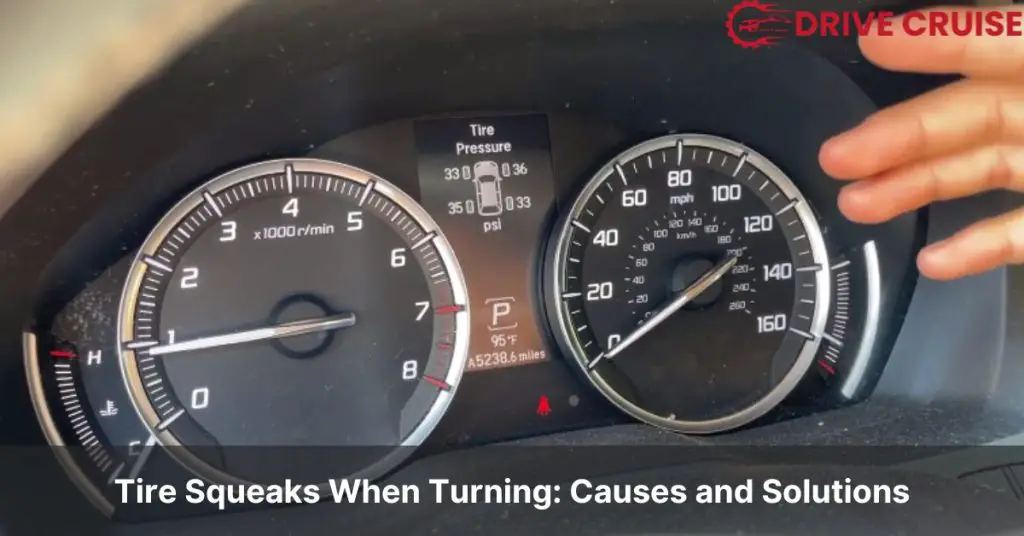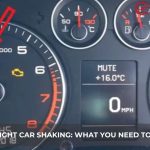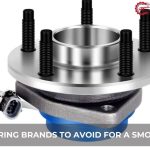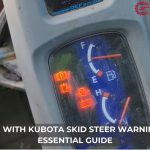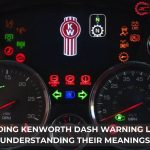Tires squeaking when turning can be a common annoyance for drivers. If you’ve ever experienced this sound, you know how irritating it can be. But did you know that tire squeaks can also indicate underlying issues that may need to be addressed?
Squealing tires can be caused by a variety of factors. One of the most common causes is improper air pressure. When your tires are underinflated, they don’t have the proper amount of air to support the weight of your vehicle. This can cause the tires to flex and deform, leading to squeaking sounds when you turn.
Another potential cause of tire squeaks is uneven tread wear. When your tires wear unevenly, they can become misshapen and lose their grip on the road. This can cause the tires to squeal when you turn, especially at higher speeds. If you notice your tires are wearing unevenly, it’s important to have them checked by a professional to determine the underlying cause.
Causes of Tire Squealing While Turning
If you hear your tires squealing or making noise when turning, it could be due to a number of factors. Here are some common causes of tire squealing while turning:
Underinflation
Underinflated tires can cause excessive sidewall flexing during turns, leading to a squeaking sound. It is important to maintain proper tire pressure according to the manufacturer’s recommendations, which can be found on the placard on the driver’s door jamb or in the owner’s manual. Regular monitoring of tire pressure with a tire pressure gauge can also help prevent underinflation.
Tread Wear and Traction Issues
Worn-out tread patterns or tires nearing their replacement point can lose grip when turning, causing a squealing noise. Look for specific tread depth indicators, which are typically small raised sections within the tread grooves, that signal the need for new tires. It is important to replace tires before reaching the wear bars to maintain safe handling and avoid potential blowouts.
Alignment Issues
Misaligned wheels can cause uneven tire wear and excessive scrubbing during turns, potentially leading to a squealing sound. Wheel alignment is important for maintaining optimal tire wear and overall vehicle handling. The process of wheel alignment should be periodically checked or after any significant impacts, such as potholes.
Suspension Problems
Worn suspension components, such as bushings and struts, can contribute to tire noise during turns due to improper movement and potential binding. Worn suspension components can also affect vehicle handling and stability. If a tire squeal is accompanied by other symptoms like clunking noises or a loose steering feel, it is recommended to consult a mechanic for a suspension inspection.
Less Common Causes of Tire Squealing
If you have ruled out the more common causes of tire squealing, such as low tire pressure or worn tires, there are a few less common issues that may be causing the noise. Here are two possible culprits:
Brake Issues
Worn brake pads or a sticking caliper can sometimes cause a squealing sound, especially when turning and applying the brakes simultaneously. If you suspect that your brakes may be the cause of the noise, it is best to consult a mechanic to diagnose the source of the problem. A grinding sensation accompanying the squeal may indicate that the brake pads are worn down and need to be replaced.
Foreign Objects Lodged in the Tread
A foreign object lodged in the tire tread, such as a nail or screw, can cause a scraping or squealing sound when contacting the road surface during turns. If you suspect that there may be a foreign object in your tire, it is important to visually inspect the tires for any embedded objects. If you find anything, have it removed promptly to avoid punctures.
It is important to note that these less common causes of tire squealing are not as frequent as the more common causes. If you have ruled out the more common issues and are still experiencing tire noise when turning, it is recommended to have your vehicle inspected by a mechanic to diagnose and resolve the problem.
Resolving the Tire Squeal: Recommendations
If you’re experiencing tire squeal when turning, it’s important to address the underlying issues to ensure safe vehicle operation. Ignoring the issue can lead to further tire wear, potential blowouts, and compromised handling.
Prioritize Safety: Address Underlying Issues
The first step in resolving tire squeal is to identify the root cause of the issue. Common causes include underinflation, worn tires, and misaligned wheels. If you’re experiencing a squeaking noise when turning at low speeds, it could be due to low power steering fluid.
To address these issues, start by checking your tire pressure and ensuring that your tires are properly inflated. Check your vehicle owner’s manual for the recommended tire pressure. If your tires are worn or damaged, it’s important to replace them as soon as possible to avoid further damage to your vehicle.
If you’re still experiencing tire squeal after addressing these issues, it may be necessary to take your vehicle to a qualified mechanic for further diagnosis.
Professional Diagnosis for Complex Issues
If the source of the tire squeal is unclear or involves potential suspension or brake problems, it’s recommended to seek professional diagnosis from a qualified mechanic. They can diagnose and repair more complex issues that may be causing the squealing noise.
DIY Solutions for Simple Issues
For simple issues like underinflation or removing foreign objects from the tread, there are DIY solutions available. However, it’s important to exercise caution when attempting DIY repairs for more complex causes. If you’re not confident in your ability to diagnose and repair the issue, it’s best to seek professional help.
Preventing Future Tire Squeals: Maintenance Tips
Tire squeals can be annoying and can also be a sign of underlying issues with your vehicle. Preventing future tire squeals requires regular maintenance of your tires and wheels. Here are some tips to help you maintain your tires and prevent future squeals.
Regular Tire Maintenance
Regular tire maintenance is crucial to prevent tire squeals. You should recommend regular tire pressure checks and inflation adjustments according to the manufacturer’s specifications. Proper tire inflation is essential for maintaining traction and stability on the road. Overinflated tires can cause the center of the tire to wear out faster, while underinflated tires can cause the edges of the tire to wear out faster.
You should also recommend tire rotations at recommended intervals for even wear. Tire rotation helps to distribute the wear evenly across all four tires and prolongs the life of your tires. You should also advise your readers to check their tire treads regularly for signs of wear and tear. Worn tire treads can cause the tire to lose traction and lead to tire squeals.
Proper Wheel Alignment
Proper wheel alignment is essential for maintaining proper tire contact with the road. You should recommend getting wheel alignments checked periodically or after any significant impacts to maintain proper tire contact with the road. Misaligned wheels can cause uneven tire wear and lead to tire squeals.
Timely Tire Replacements
Emphasize the importance of replacing tires before reaching the wear bars to maintain optimal tread depth and grip. You should advise your readers to replace their tires when they notice visual signs of excessive tread wear. Signs of excessive tread wear include worn indicators and uneven wear patterns. Worn out tires can cause tire squeals, reduce traction, and lead to accidents.
Conclusion: Maintaining a Smooth and Quiet Ride
In conclusion, addressing tire squealing is crucial to ensure safe vehicle operation and a pleasant driving experience. Regular maintenance practices can help prevent future occurrences of tire squealing and ensure that your vehicle remains in top condition.
One of the main causes of tire squealing is worn or damaged tires. It is important to regularly inspect your tires for signs of wear and replace them as necessary. Maintaining proper tire pressure is also essential for maximizing vehicle efficiency and range, as well as preventing tire squealing.
Another common cause of tire squealing is worn or damaged brake components. Regular brake inspections and maintenance can help prevent brake-related tire squealing. If you experience persistent tire squealing when turning, it is important to have your vehicle inspected by a professional to ensure that all components are in proper working order.
In addition to regular maintenance, there are also some driving habits that can help prevent tire squealing. Avoid sudden turns or aggressive driving maneuvers, as these can put additional strain on your tires and increase the risk of tire squealing.
Related Posts:
- BFGoodrich Mud Terrain T/A KM2 vs KM3: Which One to Choose?
- Continental vs Bridgestone Tires: Which One is the Best for You?
- Goodyear vs Bridgestone Tires: Which is the Best Option for Your Vehicle?
- Honda Civic Stolen Without Keys: Tips to Prevent Car Theft
- How Many Gears Does a Semi Truck Have? A Friendly Guide to Understanding Semi Truck Transmissions
- How to Complete Drive Cycle Without Driving: Tips and Tricks
- Starting Disabled Service Throttle: A Step-by-Step Guide
- Tire Squeaks When Turning: Causes and Solutions
- Toyota Highlander Off Road Mods: Enhance Your Adventure Experience
- Yokohama Advan Sport A S Plus Review: A Friendly Guide to a Top-Performing Tire

